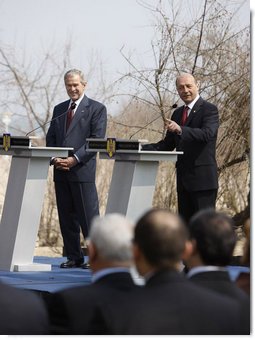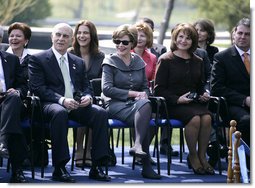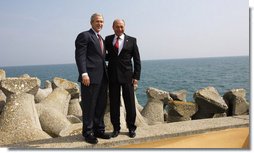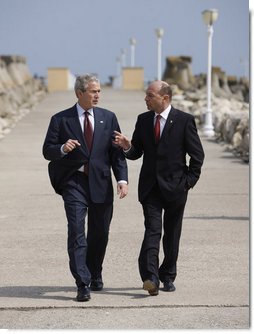
- Afghanistan
- Africa
- Budget Management
- Defense
- Economy
- Education
- Energy
- Environment
- Global Diplomacy
- Health Care
- Homeland Security
- Immigration
- International Trade
- Iraq
- Judicial Nominations
- Middle East
- National Security
- Veterans
|
Home >
News & Policies >
April 2008
|
For Immediate Release
Office of the Press Secretary
April 2, 2008
President Bush Participates in Joint Press Availability with President Basescu of Romania
Protocol Villas Neptun-Olimp
Neptun, Romania
1:40 P.M. (Local)
PRESIDENT BASESCU: Mr. President, you will be the first.
PRESIDENT BUSH: Well, thank you very much. Bună ziua. Mr. President, thank you very much for your warm hospitality. Laura and I are thrilled to be with you and your lovely wife. I can't think of a better place to meet. It's such a beautiful setting, and you're awfully kind to have invited us to be here. After all, that's what friends do, though. And our relationship is very strong and it's very friendly.
 I admire your courage, and I admire your leadership. And I want to thank
you for hosting us -- hosting NATO in
Bucharest. It is -- you know, it's a big deal. And what's interesting is
20 years ago, our nations were separated by a
Cold War and Romania was a member of the Warsaw Pact, and the Romanian
people suffered under a cruel dictator. Today,
think how things have changed. The Romanian people are free, we're strong
allies, we appreciate you in NATO. And I want
to thank you for your historic contributions to NATO.
I admire your courage, and I admire your leadership. And I want to thank
you for hosting us -- hosting NATO in
Bucharest. It is -- you know, it's a big deal. And what's interesting is
20 years ago, our nations were separated by a
Cold War and Romania was a member of the Warsaw Pact, and the Romanian
people suffered under a cruel dictator. Today,
think how things have changed. The Romanian people are free, we're strong
allies, we appreciate you in NATO. And I want
to thank you for your historic contributions to NATO.
I want to thank you and the people of Romania for your contributions to Afghanistan. There are about 600 Romanian troops there. The Afghan people are grateful, as am I. I want to thank you for your contribution to the troops in Iraq. These are tough decisions, but I think they're necessary decisions to keep the peace. You and I have discussed our desire to work closely with those countries to encourage their success -- for their sake and for the sake of peace.
I appreciate very much our discussions we had on NATO enlargement. Romania and the United States agree that our Alliance must continue to be open to new members that share our values and to make tough choices to reform, and countries that are willing to address our security needs jointly. To this end, I strongly believe that Croatia, Albania and Macedonia should joint NATO as full members; that we ought to extend MAP to Ukraine and Georgia; and that we strongly support the requests of Montenegro and Bosnia-Herzegovina for Intensified Dialogue with the NATO Alliance; and that we ought to open the door to closer cooperation with Serbia. And I thank you for your advice on these issues, and I appreciate your stand.
I also appreciate your leadership in the Black Sea region. Maybe that's why you invited me here, because you're showing such good leadership in the Black Sea region. (Laughter.) But we share your concerns about enhanced security and making sure this part of the world becomes relevant in a global economy. That's why we've contributed $10 million to the Black Sea Trust, to help fund programs across the region, to strengthen civil society programs, the rule of law, and democratic governance.
I want to thank you very much for your view of the market, that markets flourish and grow when entrepreneurs are encouraged. The Romanian economy is strong. One of the reasons we launched the Romanian-American Education Foundation and made it go forward is because of the success of your economy and your entrepreneurs. And I want to congratulate you on your rate of growth and on your vision.
 All in all, Mr. President, I am really glad I came. And I thank you and
Mrs. for your hospitality. I appreciate the
really good lunch. If the American press hasn't eaten Romanian ice cream,
I strongly suggest you try it. (Laughter.)
All in all, Mr. President, I am really glad I came. And I thank you and
Mrs. for your hospitality. I appreciate the
really good lunch. If the American press hasn't eaten Romanian ice cream,
I strongly suggest you try it. (Laughter.)
Thank you very much, sir.
PRESIDENT BASESCU: (As translated.) Thank you very much, Mr. President. Firstly, Mr. President, I would like to extend my thanks to you for offering the invitation to reserve a few hours for a visit on the land where I was born in Dobrogea on the Black Sea shore. Just as we have discussed in Washington 2005-2006, our partnership has exceeded for a long time the stage of a simple partnership, military partnership, a partnership that was envisaged firstly Romanian security.
We're now in the stage of partnership with a very strong and consistent economic component. Following 2005, Oracle was present in Romania; also Smithfield with great investment in the food industry; also Ford is present here. And this means that the Romanian-American partnership covers practically all the aspects, and we hope to a further development.
I would like to extend my thanks to you for the attention that your administration has been paying to the Black Sea region, for your concern related to the security in the Black Sea region, and for your concern related to the need to guarantee democracy in the Black Sea region.
Moreover, Mr. President, I would like to underline the confidence that the United States has had in the Romanian army, by placing under Romanian command important troops in Afghanistan. It was a token of confidence that you have given to us, and we are aware that it is -- very aware that the United States placed their troops under the command of other countries. Thank you very much.
To conclude, I would like to underline the similarity of approach concerning the region where we find -- whether we speak about the Balkans, or Ukraine, or Georgia. Our approaches envisage mainly Romania's security and the security of the region. And we're glad to see that although the United States are far from this region, they have understood our concerns, the priorities of our country and of our region. Thank you very much, Mr. President, for offering with no hesitation to what we have established.
 I would like to assure you at the same time that Romania will respect all
its engagements, both the ones related to
the relation with NATO and with the European Union, and also the ones
related to the partnership and our bilateral
relation. Thank you.
I would like to assure you at the same time that Romania will respect all
its engagements, both the ones related to
the relation with NATO and with the European Union, and also the ones
related to the partnership and our bilateral
relation. Thank you.
PRESIDENT BUSH: Who do you think I ought to call on? Okay, I'll call on Roger.
Q Thank you, Mr. President. On Afghanistan, you're seeking increased commitments from NATO. There have been some new pledges. Are they enough? How many figures -- how many troops are needed? Are you satisfied with the pledges, and what are the consequences if those pledges fall short?
PRESIDENT BUSH: We expect our NATO allies to shoulder the burden necessary to succeed. And to this end, as you know, I've committed 3,200 -- 3,500 additional Marines to send a clear signal that we're willing to do our part.
I was very pleased to listen to the comments of President Sarkozy, where he indicated his willingness to increase troop presence. Other nations have agreed to step up, including Romania. And so we'll see how it goes. That's what summits are for. Summits are for opportunities for people to make clear their intentions about how they intend to support this very important mission.
And obviously, I am grateful for any nation that contributes troops to Afghanistan, as are the Afghan people. And clearly some nations are more capable than others of -- in sending troops into combat, into harm's way. We fully understand the politics that prohibit some nations from contributing, but nations need to take this mission seriously because it's in our mutual interests. It's in our interest, of course, to help young democracies survive. But in this case, it's in our interest to help succeed because we don't want an enemy that has been known to attack people -- nations in our Alliance to be able to develop safe haven again, to be able to use a launching pad like Afghanistan to plot, plan and attack.
So this is a vital mission. And it's hard work. It's a tough mission. And our allies have got to understand it's hard. Taking democracy out of the rubble of this -- of the Taliban is hard to do, just like it is in Iraq. So the question nations have to ask: Is it worth it? And my answer is, absolutely, it's worth it -- and so is the President -- it's worth it for our own security, and it's worth it for the cause of peace.
 PRESIDENT BASESCU: -- Afghanistan we have a main idea that any lack of
success of the NATO in Afghanistan will
diminish dramatically the credibility of our organization. And for the
time being, the civilized world don't have
alternatives to the security than NATO. We have to do everything what we
can in order to make a success in our action in
Afghanistan, granting democratic development of the country, economic
development of the country, security of the country,
and eliminating the terrorist risks which are generated by this region.
Sure, we have a extremely clear idea if we don't
keep the terrorists in Afghanistan, if we let them free, they'll come in
Europe, they'll come in United States. For this
reason, we have to win, we have to obtain the victory in Afghanistan.
PRESIDENT BASESCU: -- Afghanistan we have a main idea that any lack of
success of the NATO in Afghanistan will
diminish dramatically the credibility of our organization. And for the
time being, the civilized world don't have
alternatives to the security than NATO. We have to do everything what we
can in order to make a success in our action in
Afghanistan, granting democratic development of the country, economic
development of the country, security of the country,
and eliminating the terrorist risks which are generated by this region.
Sure, we have a extremely clear idea if we don't
keep the terrorists in Afghanistan, if we let them free, they'll come in
Europe, they'll come in United States. For this
reason, we have to win, we have to obtain the victory in Afghanistan.
Q Mr. President, getting back to Romania now. Behind you there is the Black Sea. Romania has insisted that NATO has to focus its attention upon this region, as well. Following the talks today, did you establish a common vision, Romania and United States, as regards the future of this region? For both. Thank you.
PRESIDENT BUSH: Your English is better than you let on. (Laughter.) I take the advice of the President on the Black Sea. He knows it well; after all, he's sailed many a vessel on this sea. As a matter of fact, I was asking the President about his days as a seafarer, a captain, and he explained to me that recently he got his captain's license renewed. (Laughter.) So not only does -- he a skillful person, he loves the Black Sea. And he understands the potential of the Black Sea.
And that's why we were happy to contribute to the Black Sea Trust Fund, as a way to help him and other visionary leaders realize the full potential of the Black Sea region. I mean, there's work to be done on regional security matters. Obviously, to the extent that people feel like they can smuggle people or drugs, then there needs to be a strategy to deal with that. The idea of trafficking human beings is abhorrent, and nobody in -- any civilized person who accepts that, you know, is just -- needs to have their head examined. And yet the President fully understands that cooperation here will help deal with the issue.
We need to promote economic cooperation. There's great potential, economic potential here. We need to promote the scenario where you can promote energy independence. All nations ought to have a variety of sources of energy from which to choose, so it's never become captured by a single supplier.
And so I fully understand the strategic importance of this area, and there's been nobody more clear and articulate on the subject than the President. And I want to thank you for your leadership.
PRESIDENT BASESCU: (As translated.) Thank you, Mr. President. As regards the Black Sea, the talks have also comprised the idea of supporting the states that have democratic options, of consolidating their institutions. The main idea, the main focus was on combating the asymmetric risks, such as the drug trafficking, persons trafficking, arms trafficking, and not lastly, our objective, the objectives that Romania's allies have endorsed, be it the European Union that has issued the Black Sea Synergy document, be it NATO -- our objective is that this region becomes a secure region, because nobody can be certain about the future if the security is not guaranteed. And this is the major objective that Romania has been promoting, the objective that our allies have endorsed, and that we support further on and that will remain a major foreign policy objective for Romania.
Q Mr. President, you pointed out this morning how much the NATO mission has changed -- it's changed dramatically over the past decades. Russia still seems to be casting a huge shadow, most recently with missile defense, with NATO expansion. Have some things not changed? Can you avoid what would appear to be something of a diplomatic train wreck when you meet with President Putin?
PRESIDENT BUSH: Look, I'm going to meet with President Putin to make it clear to him the Cold War is over and Russia is not our enemy, and that there's common ground. Obviously I've had my disagreements with the President in the past, and -- but there's also areas where we need to work in common, such as proliferation and dealing with terror. And I've got some convincing to do, but he needs to understand the missile defense system is aimed at -- aimed primarily at rogue regimes coming out of the Middle East that could hold us all hostage. And this is a -- it's a good chance for me to sit down and have yet another heart-to-heart with him. And I'm more than happy to do so.
I made it clear yesterday that NATO needs to look at expansion in our interests, not -- and not give any nation a veto power over whether or not NATO ought to extend MAP membership and/or membership. And so it's -- you know, I understand Russian concerns about the expanse of NATO. They were concerned when Romania got into NATO, I'm confident. But look what a great partner and a peaceful neighbor Romania is. Romania has no warlike aspirations. These are people who want to help other democracies thrive, and at the same time, see their economy grow. I've explained to President Putin democracies on the border of Russia are in their interest.
And so this is a good opportunity. I don't mind a good, frank discussion with President Putin. He doesn't mind telling me what's on his mind either. We've had seven years working together, a chance to have some pretty candid exchanges. And secondly -- and this is his last -- this will be our last face-to-face meeting as a presidency, and I'll thank him. I'll thank him for being candid with me. I'll thank him for serving his nation. I have no animosity toward President Putin. Just because you don't agree on issues doesn't mean you can't find a cordiality, to be able to discuss things in a frank manner, and that's the way our relationship has been. I met with him a lot in the course of my presidency, and I appreciate the fact that he invited me to Sochi.
And so I have no -- I'm not going to set any kind of expectations. I guess you are. You call it a diplomatic train wreck; I call it an opportunity to sit down and have a good, frank discussion again. And we'll see what happens, what comes out of it. It's a good opportunity for me to say good-bye and to see whether or not we can sign a strategic dialogue that will serve our nations' interest after his presidency and mine.
PRESIDENT BASESCU: (As translated.) From our point of view, and I would like to make a comment here that does not necessarily answer your question, but Romania has a relatively simple approach in relation to its ties with Russia. Firstly, we have to admit that all -- we all, particularly the former communist states, must equally and perhaps more -- to a larger extent, Russia -- we have to overcome the logics of the Cold War, because at present, there is nothing to justify this approach, this logic. Each independent state is free to have its options, and nobody can have the right, the veto right upon the options of an independent state.
Apart from this statement that regards more the principles, I would like to point out -- to refer to some issues that from our point of view are threats. For example, terrorism is a threat equally for Russia, for America, for Spain, and it can materialize at any time against Ukraine, against Georgia. So I would like to -- I could say that in this point, in this respect, we are all at the same level of risk.
The trafficking in arms is an equal threat for the Russian Federation, for the United States, for Romania, for Ukraine, for Georgia, for Albania, as well. This is another issue that we have to fight against together. The trafficking in narcotics that transforms into money for arms and into generations of youth that are deeply affected -- this threat affects equally the Russian Federation, Romania, America, France, Germany. Trafficking in human beings is another risk that affects equally Russia, America, Ukraine, Romania. And a possible cyber-attack can be deployed with an equal risk for Russia, for Romania, for America. Missile attacks that are deployed by countries that do not respect the rules, that are not part of the proliferation treaties -- this risk can affect, at any time, the Russian Federation, America, Romania, Ukraine.
Seeing, finding that the risks are the same, are almost similar, for everybody, why can't we find a common ground for solidarity between us, among us -- NATO member states, Russia Federation, aspiring NATO states -- a common ground for generating the same policy? Actually, the only thing that hinders us from acting united against the risks that affect us equally is the fact that some of us are still attached to the logics, to the approach of the Cold War, and do not have an equal respect for the democratic rights of the people.
Q Mr. President, the Romanians have a great expectation with regards to the very good ties, political and economic, between the two states. In a very practical manner, they will ask, when will we have the same regime as the other citizens from the European Union, with regards to the visas? Could we have a deadline for this when we could travel freely to the United States?
PRESIDENT BUSH: First of all, your President was very articulate on the subject of visas. One of the benefits of having a good friendship is that he's not afraid of telling me what's on his mind. (Laughter.) And he made it abundantly clear that visa policy in America must take into account Romanian past, and also Romanian future and present. In other words -- and I fully understand the frustrations of the Romanian people. I understand it. I understand that a citizen says, wait a minute, we're contributing soldiers in Iraq, and yet we're not necessarily treated like other nations in the European collective, or European Union.
And those frustrations are clearly understandable. That's why I went to Congress and tried to get them to modernize the visa law. And all they -- although they changed the law, it still creates certain hurdles for nations like Romania. And I assured the President that we will work with him as best as we can to adhere to our law and to, at the same time, understands the contradictions.
It's -- hopefully, the new law will -- and our cooperation will make it easier for Romanian citizens to come and visit their relatives. And obviously, to the extent that somebody tries to come and not come back is something we all got to guard about. That's -- but the idea of somebody coming to visit a relative or a long-lost cousin to say hello and to see what America is like, and then come back to Romania is an issue that we just got to be thoughtful about.
And so, yes, I mean, this is -- this subject came up. It is clear there's a level of frustration. I explained our new law is in effect, and we'll work closely with the Romanian government to meet our law, and at the same time meet the demands of a strong and good ally.
Thank you. Thank you very much.
Oh, you want to go over here?
PRESIDENT BASESCU: Just a moment.
PRESIDENT BUSH: Oh, you got --
PRESIDENT BASESCU: Just a moment.
PRESIDENT BUSH: He's not through.
PRESIDENT BASESCU: (As translated.) The information I would like to add to refer to two delicate issues, issues that are visible for the Romanian public. We have also approached -- we have also addressed the visa issue and also the Teo Peter issue, and we hope to find in time the decision taken by President Bush was that in the near future, we will launch the bilateral mechanism that -- apart from the European ones. And referring to the other issue, to find as fast as possible a reasonable solution acceptable for the family of Teo Peter.
END 2:05 P.M. (Local)


